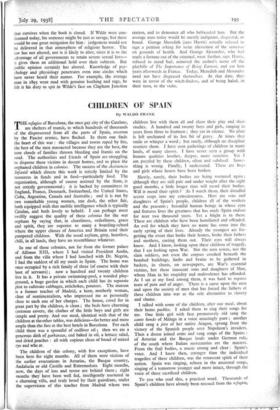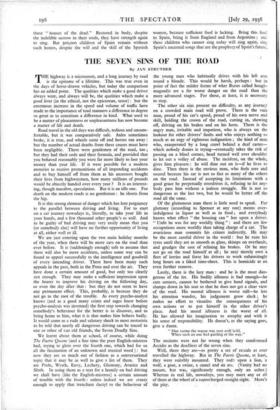CHILDREN OF SPAIN
By WALDO FRANK
THE refugios of Barcelona, the once gay city of the Catalans, are shelters of transit, to which hundreds of thousands of the dispossessed from all the parts of Spain, overrun by the Fascist armies, have flocked. In them one finds the heart of this war : the villages and towns raped by fire, the best of the men massacred because they are the best, the torn shreds of families thrown bleeding and frantic on the road. The authorities and friends of Spain are struggling to disperse these victims in decent homes, and to place the orphaned children in colonias. The success of the Assistencia Infanta which directs this work is strictly limited by the resources in funds and in food—particularly food. The organisation. although of course assisted by the State, is not strictly governmental ; it is backed by committees in England, -France, Denmark, Switzerland, the United States, Cuba, Argentina, Canada and Australia ; and it is run by two remarkable young women, one dark, the other fair, both equipped with that mobile intelligence which is typically Catalan, and both lovely to behold. I can perhaps most swiftly suggest the quality of these colonias for the war orphans by saying that, in cleanliness, orderliness, grace and spirit, they are superior to many a boarding-school where the Upper classes of America and Britain send their pampered children. With the usual asylum, grey, heartless, chill, in all lands, they have no resemblance whatever.
In one of these colonies, not far from the former palace of Alfonso XIII, where I had visited President Azafia, and from the villa where I had lunched with Dr. Negrin, I had the saddest of all my meals in Spain. The home was once occupied by a rich family of three (of course with their host of servants) ; now a hundred and twenty children live in it. It has a private swimming-pool, a wooded play- ground, a huge garden in which each child has its separate plot to cultivate cabbages, artichokes, potatoes. The matron is a former teacher of Madrid, a keen, motherly woman, clear of sentimentalism, who impressed me as personally close to each one of her charges. The house, cared for in great part by the children, is clean ; the beds have charming cretonne covers, the clothes of the little boys and girls are simple and pretty. And our meal, identical with that of the children at the other tables, was delicious—far better and more ample than the fare at the best hotels in Barcelona. For each child there was a spoonful of codliver oil ; then we ate a generous dish of garbanzas, cod baked in oil, a lettuce salad, and dried peaches : all with copious slices of bread of mixed rye and whe at. - The children of this colony, with few exceptions, have been here for eight months. All of them were victims of the earlier evacuations in Asturias, the Basque country, Andalucia or old Castille and Esiremadura. Eight months, now, the days of loss and terror are behind them ; eight months they have been well fed, intelligently nurtured in a charming villa, and truly loved by their guardians, under the supervision of this teacher from Madrid whose two children live with them all and share their play and their studies. A hundred and twenty boys and girls, ranging in years from three to fourteen ; they eat in silence. No plate is left uncleaned of its last bit of gravy. At times they smile or whisper a word ; but rarely, although no discipline restricts them. I have seen gatherings of children in many lands, of many classes. I have never seen a group with human qualities lovelier, deeper, more sensitive. Yet I am puzzled by these children, silent and subdued. Some- thing is wrong. Finally, I understand. These are boys and girls whose hearts have been broken.
Slowly, surely, their bodies are being nurtured again ; although they are still pale and under weight after the eight good months, a little longer time will mend their bodies. Will it mend their spirit ? As I watch them, their dreadful secret seeps into my consciousness. Here are sons and daughters of Spain's people, children all of the workers and the peasants ; beautiful human beings in whose eyes and features lives the greatness that has made Spain endure for near two thousand years. Yet a blight is in them. These are children who have been humiliated and offended. An evil for which they have no name has come into the early spring of their lives. Already the youngest are for- getting the event that broke their homes, broke their fathers and mothers, casting them out. Their eyes will always know. And I know, looking upon these children of tragedy, that I am looking upon War. Not the torn towns, not the slain soldiers, not even the corpses crushed beneath the bombed buildings, limbs and brains to be gathered in baskets, in sheets, on newspapers, are War's essential victims, but these innocent sons and daughters of Man, whom Man in his stupidity and malevolence has offended. As I sat at my food among them, it was hard to repress tears of pain and of anger. There is a curse upon the men and upon the society of men that has forced the fathers of these children into war as the sole alternative to slavery and shame.
I talked with some of the children, after our meal, about their home pueblos. I asked them to sing their songs for me. One little girl with face prematurely old sang the canto hondo of Malaga in a voice amazingly pure ; another child sang a jota of her native Aragon, sprung from the victory of the Spanish people over Napoleon's invaders. Then a dozen joined arms and sang songs of the Spains : of Asturias and the Basque lands under German rule, of the south where Italian mercenaries are the masters. From the frail bodies, a music strong and clear : Spain's voice. And I knew then, stronger than the individual tragedies of these children, was the renascent spirit of their nation. Spain was singing, reborn in the ancestral songs, singing of a tomorrow younger and more intact, through the voice of these sacrificed children.
To you who read this, a practical word. Thousands of Spain's children have already been rescued from the refugios those " houses of the dead." Restored in body, despite the indelible sorrow in their souls, they have strength again to sing. But 300,000 children of Spain remain without such homes, despite the will and the skill of the Spanish women, because sufficient food is lacking. Bring this food to Spain, bring it from England and from Argentina ; an C. these -children who cannot sing today will sing again, sing Spain's ancestral songs that are the prophecy of Spain's future.



































 Previous page
Previous page